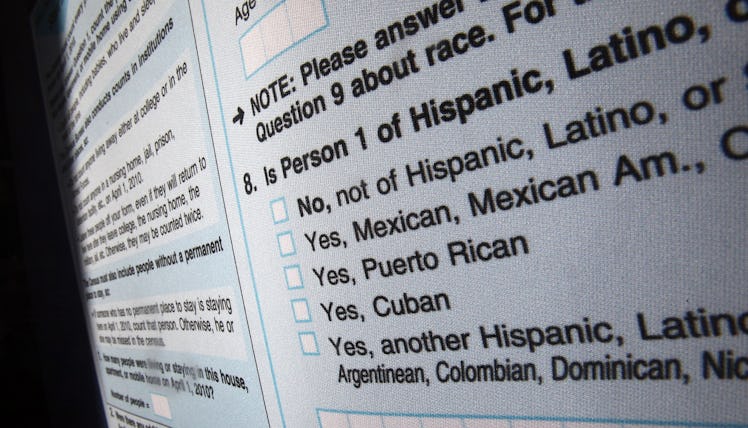
Trump Added A Citizenship Question To The Census & It Could Have Big Implications
On Monday, March 26, the U.S. Department of Commerce (DOC) announced it would reinstate the citizenship question to the nation's decennial census. President Donald Trump's census citizenship question could be a huge deal not just for immigrants, but for Americans at large. The question, if it goes through, would have massive implications for federal-level decisions about political representation and funding.
In a statement, the U.S. Department of Commerce said the decision by Commerce Secretary Wilbur Ross to reinstate the question was made in order to enforce the Voting Rights Act (VRA), at the request of the Department of Justice (DOJ.) The question hasn't been included on the census since 1950.
Per the U.S. Census Bureau (BOC), the next census will be conducted in April 2020. But any questions that will appear on that census must be submitted to Congress by March 31, 2018, meaning there's just a few days to make decisions that could have far-reaching implications on our country for years to come.
According to The Hill, attorneys general in seven blue states are suing over the question, arguing that it could threaten the accuracy of the census data. They say that a question about citizenship on the census could cause immigrants, legal or not, to avoid answering the census altogether out of fear, meaning they might not accurately be counted. Per the Pew Research Center, there are currently about 1 million unauthorized immigrants living in the United States with protected status, and a total of about 11 million undocumented immigrants overall.
In an op-ed for the San Francisco Chronicle published Monday, California Attorney General Xavier Becerra and California Secretary of State Alex Padilla called for Ross to reject the question from the upcoming census. They wrote,
Think travel bans, repeal of Deferred Action for Childhood Arrivals, ramped up Immigration and Customs Enforcement raids that tear parents away from their children. Immigrants and their loved ones understandably are, and will be, concerned about how data collected in the 2020 Census will be used.
In a letter obtained by The Washington Post, former BOC chiefs warn Ross against including the citizenship question, saying, "It is highly risky to ask untested questions in the context of the complete 2020 Census design," and could affect the count.
"A question about US citizenship on 2020 census will massively depress responses from immigrants & sabotage entire census," Ari Berman, Mother Jones writer and author of Give Us The Ballot tweeted Monday. "This is huge crisis for democracy."
Former U.S. Attorney General Eric Holder tweeted, "Constitution does not require citizenship question. This is purely political. Trump Administration is trying to rig the 2020 Census (to protect gerrymandering) by intimidating people. Don't be fooled-some states will unfairly lose funds and representation. We will sue."
The decennial census might seem like a dry, routine check-up, but in fact, the information it provides is massively influential. The data are used to determine not just how the demographics of our country are changing, but to make federal-level decisions.
Per the BOC, census data "directly affect how more than $400 billion per year in federal and state funding are allocated to local, state and tribal governments." They also help determine allocations for disaster preparedness and recovery and emergency funding.
In this way, the citizenship question could also stand to change how that $400 billion gets distributed to different communities around the country. If on paper, the population size of a region is significantly smaller, then the federal government will likely set aside fewer dollars to provide for things like education and social services to assist that area. It's not that there are fewer people actually living there who need that funding; it's that there are fewer citizens living there — a significant distinction that the census question would pose.
On the political side of things, the attorneys general point out, the citizenship question could change the number of U.S. representatives to Congress allotted to immigrant-heavy states like California, where millions of immigrants contribute to the labor force and pay billions of dollars in taxes, should they refuse to participate in the census out of fear.
In a purely strategic sense, members of Congress may feel the heat of accountability most from those who are helping keep them in office — their voting constituents and their donors. But that's hardly encompassing of everyone they represent.
Simply, representatives of Congress represent the people of their district, which includes non-voters. Think about all the people in a district who can't vote: children, for one, are not voting their officials into office, but they're certainly affected by their representatives' decisions. So having millions of people not being counted in the census could pose a big problem.
Congress currently has 435 voting members in the House, a fixed number set by law and allocated per state based on population size. (This doesn't include the 6 members of the House representing U.S. territories like Puerto Rico, who don't enjoy full voting rights.) So if a headcount in a state like California changes drastically, it could result in altering the number of representatives the state is given. California currently has the largest number of U.S. representatives, with 53.
A final decision on whether to include the census question, according to the BOC deadline, will come at the end of this week.